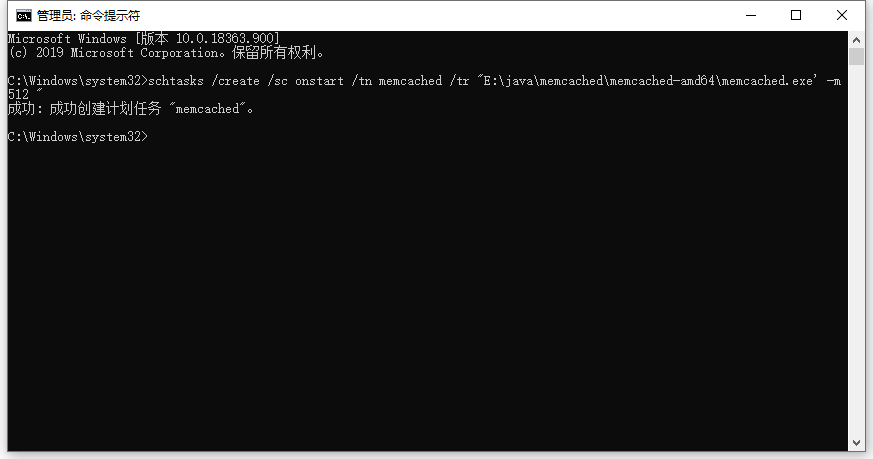发表于: 2020-06-29 21:41:15
1 1809
今天完成的事情:Memcache
什么是Memcache
Memcache是一个高性能的分布式的内存对象缓存系统,通过在内存里维护一个统一的巨大的hash表,它能够用来存储各种格式的数据,包括图像、视频、文件以及数据库检索的结果等。简单的说就是将数据调用到内存中,然后从内存中读取,从而大大提高读取速度。
为什么会有Memcache和memcached两种名称
Memcache是这个项目的名称,而memcached是它服务器端的主程序文件名
在电脑上配置Memcache
管理员运行以下命令

Spring集成Memcached
(1)Memcached Client for Java 比 SpyMemcached更稳定、更早、更广泛;
(2)SpyMemcached d 比 Memcached Client for Java更高效;
(3)XMemcached 比 SpyMemcache并发效果更好。
选用第三种 编写工具类
依赖
<!-- xmemcached-->
<dependency>
<groupId>com.googlecode.xmemcached</groupId>
<artifactId>xmemcached</artifactId>
<version>2.4.4</version>
</dependency>
</dependencies>
xmemcached.properties配置文件:
#连接池大小即客户端个数
memcached.connectionPoolSize=1
memcached.failureMode=true
#server1
memcached.server1.host=127.0.0.1
memcached.server1.port=11211
memcached.server1.weight=1
xmemcached.xml
<?xml version="1.0" encoding="UTF-8"?>
<beans xmlns="http://www.springframework.org/schema/beans"
xmlns:xsi="http://www.w3.org/2001/XMLSchema-instance" xmlns:mvc="http://www.springframework.org/schema/mvc"
xmlns:context="http://www.springframework.org/schema/context"
xmlns:tx="http://www.springframework.org/schema/tx" xmlns:task="http://www.springframework.org/schema/task"
xmlns:aop="http://www.springframework.org/schema/aop"
xsi:schemaLocation="
http://www.springframework.org/schema/mvc http://www.springframework.org/schema/mvc/spring-mvc-3.1.xsd
http://www.springframework.org/schema/beans http://www.springframework.org/schema/beans/spring-beans-3.1.xsd
http://www.springframework.org/schema/context http://www.springframework.org/schema/context/spring-context-3.1.xsd
http://www.springframework.org/schema/tx http://www.springframework.org/schema/tx/spring-tx-3.1.xsd
http://www.springframework.org/schema/task http://www.springframework.org/schema/task/spring-task-3.1.xsd
http://www.springframework.org/schema/aop
http://www.springframework.org/schema/aop/spring-aop-3.0.xsd ">
<!-- properties config -->
<bean class="org.springframework.beans.factory.config.PropertyPlaceholderConfigurer">
<property name="order" value="1"/>
<property name="ignoreUnresolvablePlaceholders" value="true"/>
<property name="locations">
<list>
<value>classpath:properties/xmemcached.properties</value>
</list>
</property>
</bean>
<!-- Memcached配置 -->
<!-- p:connectionPoolSize="${memcached.connectionPoolSize}" p:failureMode="${memcached.failureMode}" -->
<bean id="memcachedClientBuilder" class="net.rubyeye.xmemcached.XMemcachedClientBuilder">
<constructor-arg>
<list>
<bean class="java.net.InetSocketAddress">
<constructor-arg value="${memcached.server1.host}"/>
<constructor-arg value="${memcached.server1.port}"/>
</bean>
</list>
</constructor-arg>
<constructor-arg>
<list>
<value>${memcached.server1.weight}</value>
</list>
</constructor-arg>
<property name="commandFactory" >
<bean class="net.rubyeye.xmemcached.command.TextCommandFactory" />
</property>
<property name="sessionLocator" >
<bean class="net.rubyeye.xmemcached.impl.KetamaMemcachedSessionLocator" />
</property>
<property name="transcoder" >
<bean class="net.rubyeye.xmemcached.transcoders.SerializingTranscoder" />
</property>
<property name="connectionPoolSize" value="${memcached.connectionPoolSize}" />
<property name="failureMode" value="${memcached.failureMode}" />
</bean>
<!-- Use factory bean to build memcached client -->
<bean id="memcachedClient" factory-bean="memcachedClientBuilder" factory-method="build" destroy-method="shutdown" />
</beans>
memcached工具类
package util;
import net.rubyeye.xmemcached.MemcachedClient;
import net.rubyeye.xmemcached.exception.MemcachedException;
import org.springframework.context.ApplicationContext;
import org.springframework.context.support.ClassPathXmlApplicationContext;
import java.util.Collection;
import java.util.Map;
import java.util.concurrent.TimeoutException;
public class XmemcachedManager {
private static final MemcachedClient memcachedClient;
static {
ApplicationContext context = new ClassPathXmlApplicationContext("xmemcached.xml");
memcachedClient = (MemcachedClient) context.getBean("memcachedClient");
}
private static final int EXP = 60*60; //seconds
private static final long TIME_OUT = 60*1000; //millis
/**
* 设置缓存数据
* @param key key
* @param value value
*/
public void set(String key,String value) throws InterruptedException, MemcachedException, TimeoutException {
memcachedClient.set(key, EXP,value);
}
/**
*替换缓存数据
*/
public void replace(String key,String value) throws InterruptedException, MemcachedException, TimeoutException {
memcachedClient.replace(key, EXP,value);
}
/**
* 删除缓存数据
*/
public void delete(String key) throws InterruptedException, MemcachedException, TimeoutException {
memcachedClient.delete(key);
}
/**
* 获取缓存数据
* @param key
* @return Object
*/
public Object get(String key) throws InterruptedException, MemcachedException, TimeoutException {
return memcachedClient.get(key);
}
public Map<String,Object> get(Collection<String> keys) throws InterruptedException, MemcachedException, TimeoutException {
return memcachedClient.get(keys);
}
}
明天计划的事情:任务六





评论